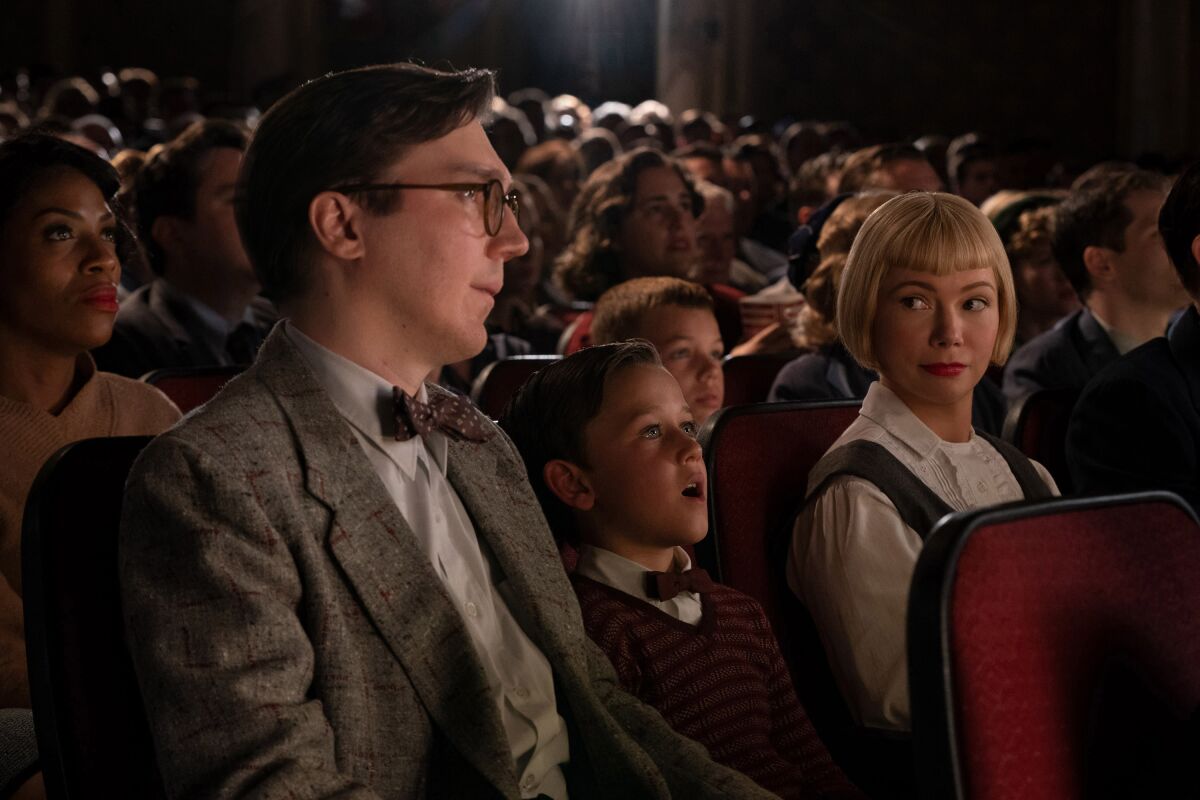Nostalgia for movie theaters abounds in current films, but good change can still come
Early in Steven Spielberg’s “The Fabelmans,” a married couple takes their young son to see his first movie. It’s early 1950s New Jersey and the palatial theater is packed to see “The Greatest Show on Earth” (1952), a Cecil B. DeMille spectacle about the denizens of a circus. The audience oooohs and ahhhhs as a massive train wreck unfolds onscreen, railroad cars flying through the air with the greatest of ease. Little Sam Fabelman, a surrogate for Spielberg’s childhood self, sits entranced, his eyes practically popping out of his head. It’s a key moment in the director’s origin story, a formative experience for the filmmaker.
As industry analysts and cinephiles fret about ever-declining movie attendance, with box office numbers stubbornly refusing to regain pre-pandemic totals, the films themselves are intent on reminding us of when moviegoing was magic — and could be still.
There’s “The Fabelmans,” in which the “Greatest Show” sequence is followed up with an adolescent Sam’s trek to see “The Man Who Shot Liberty Valance” (1962) with friends from his Boy Scout troop (with whom he then makes his own Arizona-set western).
There’s “Babylon,” Damien Chazelle’s wild epic about the movies’ transition from silents to sound, which includes a raucous New York premiere of the first talkie, “The Jazz Singer” (1927), and an emotional screening of “Singin’ in the Rain” (1952), the beloved classic musical about the rise of talking pictures.
And there’s “Empire of Light,” which follows the employees of a British seaside theater hanging on against the multiplex onslaught in the early ‘80s, thrilled that they get to host a regional premiere of “Chariots of Fire” (1981).
Without standing on a soapbox, these films, all Oscar contenders to one degree or another, remind viewers that movies are meant to be a communal experience, shared in a big, dark room full of strangers, sparking the imaginations of hundreds of people at the same moment.
“You hope you capture the magic of what it is to be in a movie theater like that,” says “Babylon” producer Matthew Plouffe. “I see it as underlining the beauty and the magnificence and the magnitude of what movie making is. ‘Babylon’ is much more than something simply reductive, like ‘a love letter to cinema.’ That phrase gets used a lot. I think if we did our jobs with ‘Babylon,’ we showed that making movies is the highest highs and the lowest lows, and life and death, and everything else.”

Paul Dano and Michelle Williams star in Steven Spielberg’s autofiction “The Fabelmans.”
(Merie Weismiller Wallace/Universal Pictures and Amblin Entertainment)
These are hardly the first films to capture that magic. In 1988’s “Cinema Paradiso,” an Oscar winner for what was then called the foreign-language film category, a director reminisces about the theater and projectionist that inspired him as a boy in his small Italian village. In “The Last Picture Show” (1971), which won supporting acting Oscars for Cloris Leachman and Ben Johnson, the local movie house stands as a fading bastion of community in a fading Texas town. Other examples abound, each speaking to the sanctity of the public movie-going space.
Today, however, such movies carry a sense of urgency. A recent Los Angeles Times analysis reported that 2022 is expected to end with about $7.4 billion in ticket sales from the U.S. and Canada, according to analysts and studio estimates, down 35% from the pre-pandemic year of 2019. (Of course, viewed through a longer lens, movie attendance peaked in 1946.) Viewers are increasingly content to stay home and stream their entertainment. The movie theater is rarely viewed as the sacred ground we witness in these new films.
“You go onto Netflix and you see all the squares that have all these films, but that doesn’t have quite the bigness that a movie has,” says Rick Carter, production designer of “The Fabelmans” and several other Spielberg films. “They’re content, but that doesn’t necessarily fill the same role I think that you collectively experience when it’s actually happening, when it’s so big and it’s involving so many other people.”
“Babylon” doesn’t just long for the movie palaces of old, or even the wild-and-woolly world of silent film and the attendant bacchanalia the movie so riotously depicts. It’s a film about the medium’s evolution, and the casualties, literal and figurative, created by the sound era. In one key sequence, producer-fixer Manny Torres (Diego Calva) is sent to New York to check out a premiere of “The Jazz Singer” to see what all the fuss is about. As Al Jolson finishes his first musical number, the audience stands and roars as a concert crowd might today, swept up in the cinema revolution that would change everything.
Later in the film, Manny, no longer in the business, sits down in a theater balcony to watch “Singin’ in the Rain.” He weeps as the film dramatizes the collapse of the silent movie world he loved. But soon, as Manny gets caught up in the joy of the movie itself, Chazelle delivers a series of rapturous movie clips, everything from silent shorts (1902’s “A Trip to the Moon,” 1903’s “The Great Train Robbery”) to modern blockbusters (“The Matrix,” “Avatar”). Chazelle’s point: The movies, like moviegoing, are forever changing. No matter how thick the nostalgia gets, something new will always be waiting around the corner. Perhaps even something better.
“The industry is constantly evolving,” Plouffe says. “I think in part that’s because it’s filled with people who want to push forward and try new things. So we’re in this constant state of pushing forward and leaving behind. That’s just the definition of what Hollywood is. Change is part of it, and you have to ride the wave.”
For all the latest Entertainment News Click Here
For the latest news and updates, follow us on Google News.
